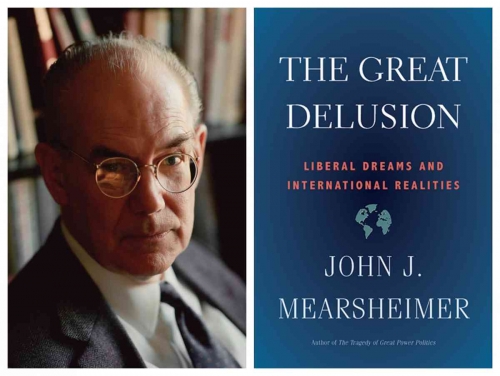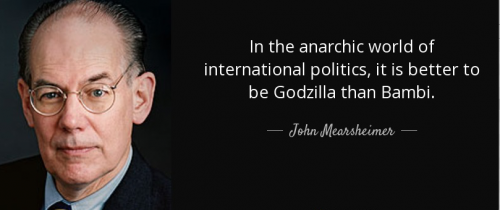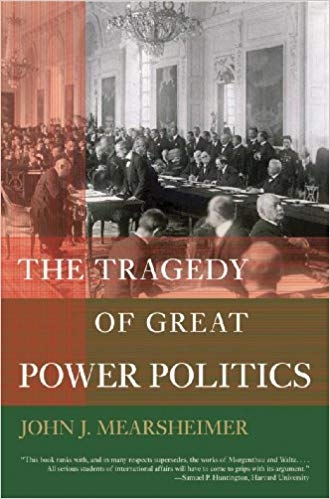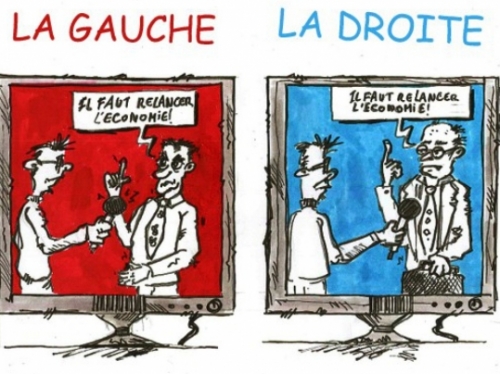mardi, 26 mars 2019
Yann-Ber Tillenon et Alice Tertrais nous parlent de Guillaume FAYE
08:22 Publié dans Actualité, Hommages, Nouvelle Droite, Synergies européennes | Lien permanent | Commentaires (0) | Tags : guillaume faye, yann-ber tillenon, nouvelle droite, synergies européennes |  |
|  del.icio.us |
del.icio.us |  |
|  Digg |
Digg | ![]() Facebook
Facebook
The Great Delusion: Liberal Dreams and International Realities

The Great Delusion: Liberal Dreams and International Realities
An excerpt from John Mearsheimer's latest book.
by John J. Mearsheimer
Ex: https://nationalinterest.org
Editor’s Note: This is an excerpt from the new book The Great Delusion : Liberal Dreams and International Realities by John Mearsheimer.
Liberal hegemony is an ambitious strategy in which a state aims to turn as many countries as possible into liberal democracies like itself while also promoting an open international economy and building international institutions. In essence, the liberal state seeks to spread its own values far and wide. My goal in this book is to describe what happens when a powerful state pursues this strategy at the expense of balance-of-power politics.
Many in the West, especially among foreign policy elites, consider liberal hegemony a wise policy that states should axiomatically adopt. Spreading liberal democracy around the world is said to make eminently good sense from both a moral and a strategic perspective. For starters, it is thought to be an excellent way to protect human rights, which are sometimes seriously violated by authoritarian states. And because the policy holds that liberal democracies do not want to go to war with each other, it ultimately provides a formula for transcending realism and fostering international peace. Finally, proponents claim it helps protect liberalism at home by eliminating authoritarian states that otherwise might aid the illiberal forces that are constantly present inside the liberal state.
This conventional wisdom is wrong. Great powers are rarely in a position to pursue a full-scale liberal foreign policy. As long as two or more of them exist on the planet, they have little choice but to pay close attention to their position in the global balance of power and act according to the dictates of realism. Great powers of all persuasions care deeply about their survival, and there is always the danger in a bipolar or multipolar system that they will be attacked by another great power. In these circumstances, liberal great powers regularly dress up their hard-nosed behavior with liberal rhetoric. They talk like liberals and act like realists. Should they adopt liberal policies that are at odds with realist logic, they invariably come to regret it. But occasionally a liberal democracy encounters such a favorable balance of power that it is able to embrace liberal hegemony. That situation is most likely to arise in a unipolar world, where the single great power does not have to worry about being attacked by another great power since there is none. Then the liberal sole pole will almost always abandon realism and adopt a liberal foreign policy. Liberal states have a crusader mentality hard-wired into them that is hard to restrain.
Because liberalism prizes the concept of inalienable or natural rights, committed liberals are deeply concerned about the rights of virtually every individual on the planet. This universalist logic creates a powerful incentive for liberal states to get involved in the affairs of countries that seriously violate their citizens’ rights. To take this a step further, the best way to ensure that the rights of foreigners are not trampled is for them to live in a liberal democracy. This logic leads straight to an active policy of regime change, where the goal is to topple autocrats and put liberal democracies in their place. Liberals do not shy from this task, mainly because they often have great faith in their state’s ability to do social engineering both at home and abroad. Creating a world populated by liberal democracies is also thought to be a formula for international peace, which would not just eliminate war but greatly reduce, if not eliminate, the twin scourges of nuclear proliferation and terrorism. And lastly, it is an ideal way of protecting liberalism at home.

This enthusiasm notwithstanding, liberal hegemony will not achieve its goals, and its failure will inevitably come with huge costs. The liberal state is likely to end up fi endless wars, which will increase rather than reduce the level of conflict in international politics and thus aggravate the problems of proliferation and terrorism. Moreover, the state’s militaristic behavior is almost certain to end up threatening its own liberal values. Liberalism abroad leads to illiberalism at home. Finally, even if the liberal state were to achieve its aims—spreading democracy near and far, fostering economic intercourse, and creating international institutions—they would not produce peace.
The key to understanding liberalism’s limits is to recognize its relationship with nationalism and realism. This book is ultimately all about these three isms and how they interact to affect international politics.
Nationalism is an enormously powerful political ideology. It revolves around the division of the world into a wide variety of nations, which are formidable social units, each with a distinct culture. Virtually every nation would prefer to have its own state, although not all can. Still, we live in a world populated almost exclusively by nation-states, which means that liberalism must coexist with nationalism. Liberal states are also nationstates. There is no question that liberalism and nationalism can coexist, but when they clash, nationalism almost always wins.
The influence of nationalism often undercuts a liberal foreign policy. For example, nationalism places great emphasis on self-determination, which means that most countries will resist a liberal great power’s efforts to interfere in their domestic politics—which, of course, is what liberal hegemony is all about. These two isms also clash over individual rights. Liberals believe everyone has the same rights, regardless of which country they call home. Nationalism is a particularist ideology from top to bottom, which means it does not treat rights as inalienable. In practice, the vast majority of people around the globe do not care greatly about the rights of individuals in other countries. They are much more concerned about their fellow citizens’ rights, and even that commitment has limits. Liberalism oversells the importance of individual rights.
 Liberalism is also no match for realism. At its core, liberalism assumes that the individuals who make up any society sometimes have profound differences about what constitutes the good life, and these differences might lead them to try to kill each other. Thus a state is needed to keep the peace. But there is no world state to keep countries at bay when they have profound disagreements. The structure of the international system is anarchic, not hierarchic, which means that liberalism applied to international politics cannot work. Countries thus have little choice but to act according to balance-of-power logic if they hope to survive. There are special cases, however, where a country is so secure that it can take a break from realpolitik and pursue truly liberal policies. The results are almost always bad, largely because nationalism thwarts the liberal crusader.
Liberalism is also no match for realism. At its core, liberalism assumes that the individuals who make up any society sometimes have profound differences about what constitutes the good life, and these differences might lead them to try to kill each other. Thus a state is needed to keep the peace. But there is no world state to keep countries at bay when they have profound disagreements. The structure of the international system is anarchic, not hierarchic, which means that liberalism applied to international politics cannot work. Countries thus have little choice but to act according to balance-of-power logic if they hope to survive. There are special cases, however, where a country is so secure that it can take a break from realpolitik and pursue truly liberal policies. The results are almost always bad, largely because nationalism thwarts the liberal crusader.
My argument, stated briefly, is that nationalism and realism almost always trump liberalism. Our world has been shaped in good part by those two powerful isms, not by liberalism. Consider that five hundred years ago the political universe was remarkably heterogeneous; it included city-states, duchies, empires, principalities, and assorted other political forms. That world has given way to a globe populated almost exclusively by nation states. Although many factors caused this great transformation, two of the main driving forces behind the modern state system were nationalism and balance-of-power politics.
The American Embrace of Liberal Hegemony
This book is also motivated by a desire to understand recent American foreign policy. The United States is a deeply liberal country that emerged from the Cold War as by far the most powerful state in the international system. 1 The collapse of the Soviet Union in 1991 left it in an ideal position to pursue liberal hegemony. 2 The American foreign policy establishment em braced that ambitious policy with little hesitation, and with abundant optimism about the future of the United States and the world. At least at first, the broader public shared this enthusiasm.
The zeitgeist was captured in Francis Fukuyama’s famous article, “The End of History?,” published just as the Cold War was coming to a close. 3 Liberalism, he argued, defeated fascism in the first half of the twentieth century and communism in the second half, and now there was no viable alternative left standing. The world would eventually be entirely populated by liberal democracies. According to Fukuyama, these nations would have virtually no meaningful disputes, and wars between great powers would cease. The biggest problem confronting people in this new world, he suggested, might be boredom.
It was also widely believed at the time that the spread of liberalism would ultimately bring an end to balance-of-power politics. The harsh security competition that has long characterized great-power relations would disappear, and realism, long the dominant intellectual paradigm in international relations, would land on the scrap heap of history. “In a world where freedom, not tyranny, is on the march,” Bill Clinton proclaimed while campaigning for the White House in 1992, “the cynical calculus of pure power politics simply does not compute. It is ill-suited to a new era in which ideas and information are broadcast around the globe before ambassadors can read their cables.”
Probably no recent president embraced the mission of spreading liberalism more enthusiastically than George W. Bush, who said in a speech in March 2003, two weeks before the invasion of Iraq: “The current Iraqi regime has shown the power of tyranny to spread discord and violence in the Middle East. A liberated Iraq can show the power of freedom to transform that vital region, by bringing hope and progress into the lives of millions. America’s interests in security, and America’s belief in liberty, both lead in the same direction: to a free and peaceful Iraq.” Later that year, on September 6, he proclaimed: “The advance of freedom is the calling of our time; it is the calling of our country. From the Fourteen Points to the Four Freedoms, to the Speech at Westminster, America has put our power at the service of principle. We believe that liberty is the design of nature; we believe that liberty is the direction of history. We believe that human fulfillment and excellence come in the responsible exercise of liberty. And we believe that freedom—the freedom we prize—is not for us alone, it is the right and the capacity of all mankind.”
Something went badly wrong. Most people’s view of U.S. foreign policy today, in 2018, is starkly different from what it was in 2003, much less the early 1990s. Pessimism, not optimism, dominates most assessments of America’s accomplishments during its holiday from realism. Under Presidents Bush and Barack Obama, Washington has played a key role in sowing death and destruction across the greater Middle East, and there is little evidence the mayhem will end anytime soon. American policy toward Ukraine, motivated by liberal logic, is principally responsible for the ongoing crisis between Russia and the West. The United States has been at war for two out of every three years since 1989, fighting seven different wars. We should not be surprised by this. Contrary to the prevailing wisdom in the West, a liberal foreign policy is not a formula for cooperation and peace but for instability and conflict.
In this book I focus on the period between 1993 and 2017, when the Clinton, Bush, and Obama administrations, each in control of American foreign policy for eight years, were fully committed to pursuing liberal hegemony. Although President Obama had some reservations about that policy, they mattered little for how his administration actually acted abroad. I do not consider the Trump administration for two reasons. First, as I was finishing this book it was difficult to determine what President Trump’s foreign policy would look like, although it is clear from his rhetoric during the 2016 campaign that he recognizes that liberal hegemony has been an abject failure and would like to abandon key elements of that strategy. Second, there is good reason to think that with the rise of China and the resurrection of Russian power having put great power politics back on the table, Trump eventually will have no choice but to move toward a grand strategy based on realism, even if doing so meets with considerable resistance at home.
John J. Mearsheimer is the R. Wendell Harrison Distinguished Service Professor of Political Science at the University of Chicago. His many books include The Tragedy of Great Power Politics and Conventional Deterrence .
00:56 Publié dans Actualité, Géopolitique, Livre, Livre, Théorie politique | Lien permanent | Commentaires (0) | Tags : john j. mearsheimer, états-unis, livre, politique internationale, géopolitique, actualité, théorie politique, politologie, sciences politiques, philosophie politique |  |
|  del.icio.us |
del.icio.us |  |
|  Digg |
Digg | ![]() Facebook
Facebook
Il est urgent de dépasser le clivage gauche-droite

Il est urgent de dépasser le clivage gauche-droite
Les grands médias alliés aux oligarques continuent de nous prendre pour des ânes en mettant en scène un combat simulé entre la gauche et la droite. Et, certains chroniqueurs en rajoutent en souhaitant que la jeunesse sorte de sa torpeur actuelle afin de reprendre goût à cette politique des apparences qui aura contribué à berner leurs parents. Parce que les clivages auxquels nous sommes habitués nous empêchent de poser les bons diagnostics sur les maux qui gangrènent nos sociétés.
Les patriotes qui se battent pour la survie de leur nation doivent éviter de tomber dans le piège des catégories politiques.
Une réalité qui dépasse les clivages politiques
Le politologue Arnaud Imatz, invité à débattre de la question sur le site de réflexion Le Cercle Aristote, estime que « la division Droite/Gauche est devenue un masque, qui sert à cacher une autre division, désormais beaucoup plus décisive : celle qui oppose les peuples enracinés aux élites autoproclamées vectrices du déracinement; celle qui oppose les défenseurs de la souveraineté, de l’identité et de la cohésion nationale aux partisans de la « gouvernance mondiale »; celle qui oppose les exclus de la mondialisation rejetés dans les zones périurbaines du pays […] aux privilégiés du système, à l’oligarchie dominante, à la classe dirigeante mondialisée ou l’hyperclasse qui vit dans les beaux quartiers des grandes villes […] ».
La droite et la gauche se renvoient la balle
En bref, les partisans de la gauche reprochent aux gens de droite d’être trop conservateurs, tout en refusant les inévitables changements qui sont le lot de nos sociétés en voie de liquéfaction. À droite, on refuse les schémas proposés par une gauche qui s’acharne à vouloir tout chambouler afin de favoriser l’émergence d’un « homme nouveau », sorte de citoyen d’une société éclatée où seuls les rapports économiques constituent l’étalon de mesure. La variable d’ajustement, pour parler comme certains économistes.
À gauche, on prône une plus grande justice sociale qui serait susceptible de se réaliser à travers le dépassement des habituels clivages socioculturels qui marquent le territoire de nos cités. Il n’y a plus de culture historique qui tienne pour ces partisans d’une lutte de classe qui se concentre sur une meilleure répartition des ressources économiques. Pourtant, on a qu’à gratter le vernis gauchiste plaqué sur ce type de formations politiques pour réaliser que leurs dirigeants ne sont que des arrivistes qui rament pour obtenir un strapontin bien au chaud au parlement.
La droite n’est pas en reste au chapitre des simulacres et ça fait des lustres que ses ténors ont jeté aux orties tout ce qui pouvait s’apparenter aux vertus d’un christianisme qui est devenu un triste simulacre. La droite est affairiste, elle émaille son discours de références patriotiques afin de faire passer la pilule d’un libre-marché à tous crins. Prônant un meilleur contrôle des mouvements humains aux frontières, elle ne dit plus rien quand vient le temps de s’opposer à toute cette flopée de traités de libre-échange destinée à paver la voie au grand capital apatride. Si elle reproche à la gauche d’imposer ses idées préconçues sur les campus universitaires, elle nous enfonce sa religion de l’argent-roi profondément dans la gorge.
Détruire l’État pour réaliser la dictature des marchés
On réalise que cette nouvelle droite, qualifiée maladroitement de libertarienne par certains, fantasme sur le projet de privatiser tous les actifs d’un État qui se voulait stratège à l’époque du général de Gaulle. Il n’y a pas à dire : on dirait que la gauche et la droite se lancent des défis truqués afin de distraire les électeurs pendant que les oligarques et les banquiers se préparent à liquider tous les actifs de nos nations affaiblies.
Le mondialisme à l’œuvre n’est pas un scénario idéaliste promu par une caste d’illuminés. Il s’agit, a contrario, d’un projet particulièrement bien ficelé, quelque chose d’effectif et de pragmatique. Ses architectes ont l’intention de faire éclater toutes les balises qui structuraient nos sociétés depuis des lustres. Rien ne doit s’opposer aux desseins du grand capital et l’humanité doit devenir une réserve de main-d’œuvre corvéable à merci. Et, c’est ce qui explique pourquoi il est si important de maintenir l’illusion d’un combat des idées opposant une gauche et une droite complètement inféodées aux diktats de l’hyperclasse aux commandes. Il est temps de passer à autre chose.
Un lien pertinent : Le Cercle Aristote
- Source : CARNETS D'UN PROMENEUR
00:43 Publié dans Actualité, Théorie politique | Lien permanent | Commentaires (0) | Tags : clivage gauche-droite, gauche, droite, politique, vie politique, théorie politique, politologie, sciences politiques, philosophie politique |  |
|  del.icio.us |
del.icio.us |  |
|  Digg |
Digg | ![]() Facebook
Facebook
Matthieu Baumier : "si le clivage gauche-droite n’existe plus, c'est qu'il n’existe plus au sein de la pensée libérale-libertaire"

Matthieu Baumier : "si le clivage gauche-droite n’existe plus, c'est qu'il n’existe plus au sein de la pensée libérale-libertaire"
Ex: https://www.sudradio.fr
Matthieu Baumier, écrivain, critique, essayiste et auteur de Voyage au bout des ruines libérales-libertaires (Éditions Pierre-Guillaume de Roux) était l’invité d’André Bercoff le 6 février 2019 sur Sud Radio.
Pour Matthieu Baumier, écrivain, critique, essayiste et auteur de Voyage au bout des ruines libérales-libertaires (Éditions Pierre-Guillaume de Roux), de nos jours, "tout ce qui serait réellement à gauche ou réellement à droite est repoussé aux extrêmes et considéré comme ne pouvant pas faire partie du jeu politique". Matthieu Baumier était l’invité d’André Bercoff le 6 février 2019 sur Sud Radio dans son rendez-vous du 12h-13h, "Bercoff dans tous ses états".
Les lib-lib, un groupe social aux caractéristiques bien définies
Matthieu Baumier a commencé par expliquer ce qu’est un libéral-libertaire (lib-lib). "J’aime beaucoup la définition que donne Jean-Claude Michéa. Un libéral-libertaire, c’est la conjugaison d’un certain libéralisme économique exacerbé et d’un libéralisme culturel et politique. C’est une religion de l’illimité, l’absence d’autorité, une conception du monde hors sol, sans enracinement", a expliqué Matthieu Baumier.
Il y a néanmoins une différence entre les lib-lib et les bobos. "Le bobo est une personne qui vit dans le monde lib-lib. La différence est que le lib-lib est mondialisé et acteur de cette mondialisation. Le lib-lib est un acteur politique, médiatique, économique ou culturel, tandis que le bobo peut être un citoyen lambda", nous a raconté Matthieu Baumier.
Pour les libéraux-libertaires, tant la gauche que la droite sont des extrêmes
"Il y a le monde réel, dont on ne tient pas compte. Et en lieu et place de ce monde réel est mis en place une image du réel à laquelle on ne peut pas s’opposer. Je crois que ce processus est contre-démocratique. Par exemple, le Président Macron est légitime car il a été élu sur le plan de la démocratie participative. En revanche, le pouvoir politique actuel n’a pas de légitimité parce que la moitié des citoyens français ne sont pas représentés à l’Assemblée nationale", a estimé Matthieu Baumier.
"Nous avons tendance à considérer que le clivage droite-gauche n’existe plus. S’il n’existe plus, il n’existe plus au sein de la pensée libérale-libertaire. Tout ce qui serait réellement à gauche ou réellement à droite est repoussé aux extrêmes et considéré comme ne pouvant pas faire partie du jeu politique. C’est de ce biais que naît la contre-démocratie dans laquelle nous sommes", a poursuivi Matthieu Baumier.
Cliquez ici pour écouter l’invité d’André Bercoff dans son intégralité en podcast.
Retrouvez André Bercoff et ses invités du lundi au vendredi sur Sud Radio, à partir de midi.
00:13 Publié dans Actualité, Livre, Livre, Philosophie, Théorie politique | Lien permanent | Commentaires (0) | Tags : libéralisme libertaire, matthieu baumier, livre, théorie politique, politologie, sciences politiques, philosophie politique |  |
|  del.icio.us |
del.icio.us |  |
|  Digg |
Digg | ![]() Facebook
Facebook



